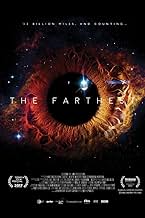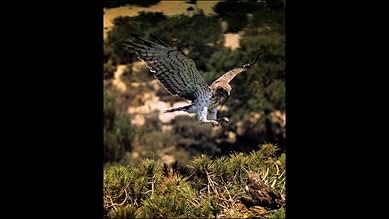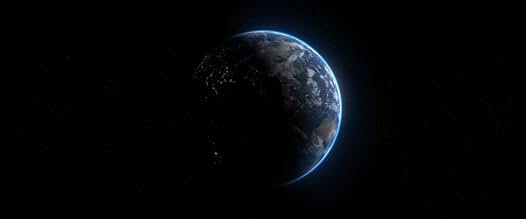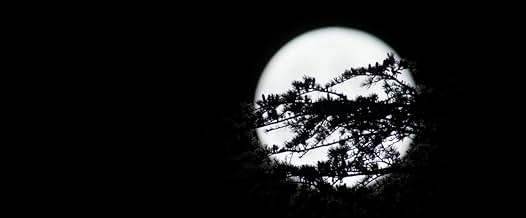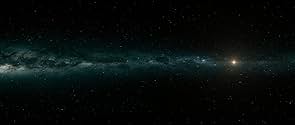Añade un argumento en tu idiomaIt is one of humankind's greatest achievements. More than 12 billion miles away a tiny spaceship is leaving our Solar System and entering the void of deep space - the first human-made object... Leer todoIt is one of humankind's greatest achievements. More than 12 billion miles away a tiny spaceship is leaving our Solar System and entering the void of deep space - the first human-made object ever to do so.It is one of humankind's greatest achievements. More than 12 billion miles away a tiny spaceship is leaving our Solar System and entering the void of deep space - the first human-made object ever to do so.
- Premios
- 12 premios y 9 nominaciones en total
Reseñas destacadas
The film was a bit too long, at two hours, and maybe it would have been more powerful as a mini-series instead. It goes through the excitement when it first reaches Jupiter, then Saturn, then the bitter sweet moment when Voyager 2 reaches Uranus at the same time that Challenger explodes and finally Neptune. Another quote was about how small color dots from the Earth telescopes turn into worlds when Voyager goes past the planets.
I love all of these documentaries, which show who worked passionately to make things like these happen, to truly further humanity against all odds and against its mostly indifferent members, shows that really show the worlds around us and expand our horizons. If you love space, you should see this.
'The Farthest' does its subject justice and as every bit a remarkable achievement. It is for me a highlight of 2017, and is accessible to anybody. One does not have to have deep knowledge of the story of the two voyagers to be completely fascinated by 'The Farthest'. It will illuminate those who do, nobody should be frustrated at not learning anything new, but has enough that will attract a wider audience who may have heard of it but not in great detail or have no knowledge and want to know more.
Visually, 'The Farthest' is stunning, beautifully photographed and those images of Jupiter, Saturn, Uranus and Neptune are enough to take the breath away. Loved the wide variety of music choices and felt they added a lot.
Emer Reynolds' direction impresses hugely, she does play it safe with combining the NASA interviews with simulations of CGI, poetic shots of Earth and archive footage. Yet it doesn't feel too safe at all, with enough ambition that never comes over as over-ambitious.
Loved the way 'The Farthest' was written and assembled. The scientific elements are hugely intriguing and illuminating to anybody watching regardless of how expertly or limited their knowledge. Then there are some philosophical elements that are thought-provoking and even touching, without being self-indulgent.
Where 'The Farthest' particularly excels are how the enthusiasm (perceptive and honest and never glorifying) of the crew (namely the scientists and engineers) is conveyed, adding even further to how inspirational this mission and story are, and how ingeniously imaginative the technology (the technology itself and behind the scenes of how it came to be) is in making the mission possible. These are presented in a very humble manner.
In summation, remarkable. 10/10 Bethany Cox
Its genuinely quite an incredible story. Especially when you remind yourself that this extremely complex, technical and frankly unprecedented undertaking was achieved using mid 70's technology. In 2012 Voyager 1 became the first man-made object to leave our solar system and reach interstellar space, having orbited all four of the giant planets taking a series of incredible pictures of them and their moons. It achieved this with computer memory a tiny fraction of what can be found in a modern smart phone. Its bordering on a miracle that this mission was accomplished, especially when you learn that certain moments were executed with split-second accuracy, a fracture of a second more would have led to destruction, such as the moment where the probe was propelled between the atmosphere of Uranus and one of its moons. It's all the more impressive when you discover that the probes were re-programmable via communication with a craft which was over a billion miles away. It was in summary one of the greatest undertakings humans have ever executed.
The documentary takes a fairly traditional talking heads format where we hear recollections of various scientists involved in the programme. Its these moments themselves which add a considerable amount of emotional weight to proceedings, making it clear that these space probes were ultimately far more than scientific equipment, they represented something far more and quite wonderful. It's not just the scientific angle of the mission but also the philosophical, such as the moment late in the mission that the cameras were reversed to look back at Earth which was now a pixel, making it clear how small we are in the universe while simultaneously making us realise that we need to look after our small planet as this little dot on a picture is all we have. There is some considerable detail given to the golden record, which contains the music, sounds and imagery of Earth. The music ranged from Mozart to Chuck Berry (with The Beatles foolishly refusing one of their songs), the imagery constitutes about one hundred pictures which attempted to convey the world as much as possible. This alien contact element of the mission was unsurprisingly given a lot of publicity at the time but it is only now that the probe has finally left our solar system that this has become the whole mission. But really, the imagery of the four mysterious giant planets is the real pinnacle of the Voyager missions and the incredible imagery that it captured remains quite extraordinary. These probes will more than likely hurtle onwards through deep space at 10 miles per second for billions of years long after our planet and sun are gone, and that says it all really.
This is slightly better than most PBS hour long specials. It's actually 96 minutes and packs an emotional punch. The wide-eyed poetry of exploration is well presented. This is a lot things. It's an underdog story. It's a scientific documentary. It's an exploration thriller. It brings back all the great discoveries. This could be great for inspiring a high school science class.
¿Sabías que...?
- Citas
Title Card: This is a present from a small distant world, a token of our sounds, our science, our images, our music, our thoughts and our feelings. We are attempting to survive our time so we may live into yours. -President Jimmy Carter's Golden Record Message, June 16th 1977
- ConexionesFeatured in Box Office: Episodio fechado 26 julio 2017 (2017)
- Banda sonoraAlima Song
From the album Music of the Ituri Forest
Courtesy of Smithsonian Folkways Recordings
Selecciones populares
- How long is The Farthest?Con tecnología de Alexa
Detalles
- Fecha de lanzamiento
- País de origen
- Idiomas
- Títulos en diferentes países
- The Farthest: Voyager in Space
- Empresas productoras
- Ver más compañías en los créditos en IMDbPro
Taquilla
- Recaudación en Estados Unidos y Canadá
- 14.773 US$
- Fin de semana de estreno en EE. UU. y Canadá
- 6900 US$
- 13 ago 2017
- Recaudación en todo el mundo
- 44.921 US$



